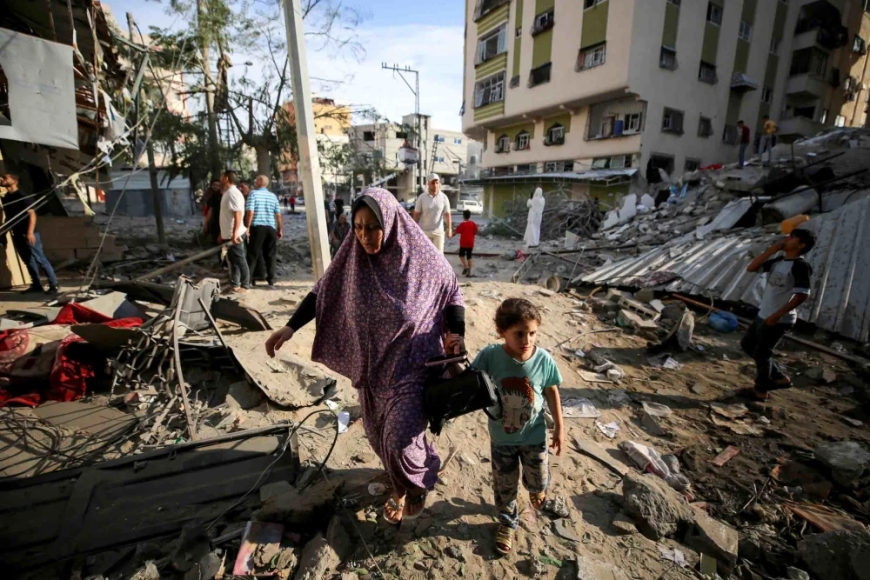Opinion: Arab and Muslim Leaders Face Dilemma in Supporting Kamala Harris Amongst Middle East Crisis

Vice President Kamala Harris has an uphill fight to secure the support of Arab and Muslim groups in the battlefield state of Michigan, where electoral success depends on them. Although Harris's presidential campaign has lately stepped up its outreach activities, many local leaders are reluctant to publicly support her candidacy due of concern for reaction from their own people furious by the Biden government's support of Israel's actions in Gaza and Southern Lebanon.
Cities like Hamtramck and Dearborn, where Arab and Muslim voters have significant political clout, highlight this conundrum especially. City councilor Mohammed Hassan of Hamtramck, a mostly Muslim city, reflected the annoyance shared by many when Harris sought opinions. Reflecting the belief that Harris and the Democratic Party are not doing enough to allay the worries of disgruntled voters, "you're doing nothing," Hassan reportedly told the campaign.
The continuous confrontation between Israel and Palestine, which has become more intense recently, is obviously the cause of this unhappiness; many Arab and Muslim Americans feel misled by the Democratic Party's posture. These towns have been consistent Democratic voters for years, but the Biden administration's relentless support of Israel has infuriated and disappointed many. Arab American News founder Osama Siblani explained the mounting animosity toward Harris supporters as a direct result of what some in the community view as U.S. involvement in genocide.
In Dearborn, a city with a sizable Palestinian and Lebanese American population, the reaction has indeed been especially strong. Families with direct links to Gaza and the West Bank are struggling with the emotional toll of the war; political leaders are left to negotiate the difficult terrain of supporting Harris without offending their constituency. Traditionally Democratic-leaning political party Arab American PAC is currently reevaluating its position; some leaders advise leaving the top of the ticket unfilled and concentrate just on local races.
This divide among the Arab and Muslim vote blocs exposes a more general difficulty for Harris: how to balance foreign policy decisions that offend important communities with her campaign's necessity to keep their support? The conflict extends beyond Michigan. Many Muslim voters, greatly troubled by the Middle East policies of the Biden government, have expressed moral and religious objections to back Harris all throughout the nation. They are torn and voice worries about how they could defend their choices on Judgment Day.
To further complicate matters, Harris has received support from various Muslim communities—especially those of South Asian, Somali, and African-American Muslims. She has been endorsed by important people including Rep. Ilhan Omar and Minnesota Attorney General Keith Ellison. Still, well-known Palestinian-American leaders like Rep. Rashida Tlaib remain adamantly opposed, highlighting even more the differences within the Muslim community.
For many, the problem is trust as much as foreign policy. At the National Arab American Convention in Dearborn, Georgia State Representative Ruwa Romman—a Palestinian-American vociferous critic of U.S. backing for Israel—was heckled. Romman, who has not endorsed Harris, was clearly frustrated by claims he supported "a genocider." This rage is not separate. Driven by a desire to protest what many believe to be the Democrats' neglect of Palestinian rights, Romman is part of the Uncommitted movement that has been gathering steam.
This irritation has also resulted in more support for third-party politicians like Green Party nominee Jill Stein, who has attracted major backing from disgruntled Arab and Muslim voters. Acknowledging the possibility of losing these voters, the Democratic National Committee produced an advertisement specifically criticizing Stein as a spoiler candidate likely to assist Trump in winning. The stakes are great, especially in swing states like Michigan where disappointed voters may sway the balance.
Harris's campaign, for its part, has aimed to create a message of inclusion. Keystones of her outreach to these groups are her loud criticism of Trump's Muslim ban and backing of Palestinian self-determination. For many voters, though, these gestures are inadequate. One observed as a lost chance to display actual solidarity was the absence of a Palestinian speaker at the Democratic National Convention. Like Hubert Humphrey with Lyndon Johnson's Vietnam policy in 1968, long-time Democratic activist Jim Zogby, head of the Arab American Institute, has urged Harris to separate herself from Biden on Israel. Zogby said Harris still has time to win back disenchanted voters, but it will take aggressive action.
Harris's ultimate difficulty is juggling the demands of a society feeling more excluded with the political reality of U.S. foreign policy. The question still stands: Can Kamala Harris close the disparity between the outreach of her campaign and the ingrained resentment among the Arab and Muslim populations as the 2024 election looms? Not only for her candidacy but also for the future of Democratic support among these vital voters, the stakes cannot be greater. Right now, the bitterness still exists, and the road to peace seems lined with challenges.













































